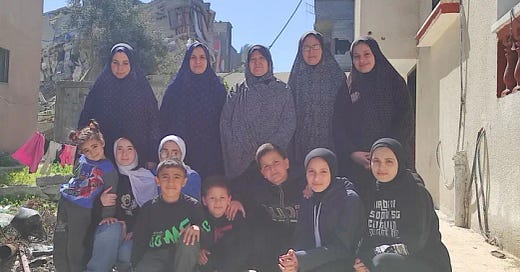I found out about the family pictured above when I heard a story on NPR about people in Gaza who are so desperate to escape conditions there that they are willing to pay—if they have it, or can borrow/scrape it together somehow—5k per adult/25k per child. They pay these exorbitant prices to Egyptian travel agencies (most notably one called Hala) with (according to the report) “ties to Egyptian security services” for entry into that country. NPR interviewed several Palestinians waiting to cross over from Rafah, one of whom described the whole system “as a bribe” then added “But what can we do? This is the only solution and option that we have.”
They also interviewed a woman named Reem Ziad; she is based on London but is trying to get 25 family members, including her parents and sisters, out of Gaza; that’s them in the picture. She is trying to raise the money through GoFundMe; after listening to the episode, I looked her up and found the page:
https://www.gofundme.com/f/urgent-appeal-to-evacuate-my-family-from-gaza
I donated and then periodically checked back to see how she was doing. I anticipated that, since NPR has millions of listeners, she would meet her goal of 125k or at least have thousands of donations to that end. Two weeks have gone by; as of this date, Ziad has 113 mostly small donations, only about 87 more than she had before NPR aired.
I find this painful and inexplicable. I imagine it must feel a hundred times that way to Reem Ziad. She has to know that NPR has an audience in the millions. She has to know that many Americans deplore the mass destruction in Gaza and the thousands of civilian deaths, to the point that it will likely affect the upcoming election. Yet here she is, on national radio, asking for help on behalf of her family located in that war zone and it’s practically crickets.
I tried to get my head around it. Many people think it’s morally better to give impersonally, via large organizations. Okay. There are thousands of people suffering in Gaza, really, all over the world. Reem Ziad is one among thousands trying to crowdfund their way out; it could, I suppose, feel random and capricious to choose one family to give aid to. It could also feel sickening to know that help to that family involves funneling money to a shady entity that is exploiting their predicament. But given the situation, I don’t know how much such feelings matter.
And, as one of the NRP interviewees noted, it is the only option for some. Given how blockades have made it nearly impossible for adequate food to get in, it seems better to give the money to a relative outside Gaza who could make travel arrangements.
A bigger possible stumbling block: some people I’m sure think its a scam or a screen for Hamas fighters or something else; I had that thought myself. GMF has unintentionally perpetrated some grotesque frauds, including George Santos absconding with money meant for a dying dog. But from what I’ve read, the GFMs related to Palestine are scrutinized and double-checked by the platform to the point that its almost like another form of blockade—that is, another layer of anguish. (I would also hope that a news organization like NPR has a sophisticated vetting process but who knows.)
So: the money might not get through in time or at all. But for me it’s worth it to at least let this woman—and God knows how many like her, on GFM—know that people hear her and are not indifferent to her family’s survival. It’s worth it if there is even a chance it will help families.
https://www.gofundme.com/f/urgent-appeal-to-evacuate-my-family-from-gaza




